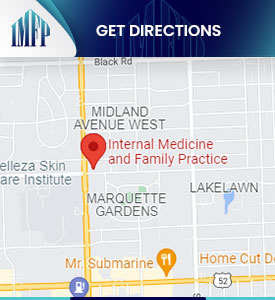How Long Does an EKG Take?
An electrocardiogram (EKG) is a diagnostic test that measures the heart’s electrical activity to monitor the heartbeat and detect various heart abnormalities. It can identify issues such as abnormal heart rhythms, whether too fast or too slow, heart valve disease, coronary artery disease, or an enlarged heart. EKG testing is available at Internal Medicine and Family Practice. For more information, contact us or book an appointment online today! We are conveniently located at 1719 Glenwood Ave Joliet, IL 60435.


Table of Contents:
How do you know if the condition of your heart is bad?
What abnormalities can be found in the EKG test?
Does your EKG results change with age?
How long does an EKG last for?
When the condition of an individual’s heart is poor, it can negatively impact almost all aspects of their health and wellness. This deterioration in heart health can present a wide range of symptoms and signs that individuals might report.
Common indicators of heart problems include chest discomfort, such as tightness, pain, or pressure, which could signify an emergency situation like a heart attack. Additionally, symptoms like stomach pain, indigestion, heartburn, nausea, or pain radiating down the arm may also be associated with heart issues.
Patients may further experience symptoms like dizziness, feelings of lightheadedness, throat or jaw pain, sweating, coughing, and an irregular heartbeat. These issues make it particularly important to undergo testing, especially for those at higher risk of heart disease, to monitor and potentially improve their heart health.
An electrocardiogram (EKG) is a diagnostic test that records the heart’s electrical activity to check the heartbeat and can reveal a range of heart abnormalities. It is capable of detecting issues such as abnormal heart rhythms that may be either too fast or too slow, heart valve disease, coronary artery disease, or an enlarged heart.
An abnormal EKG can also indicate the risk of a heart attack or identify if someone has had a previously undetected heart attack. This test is important not only for diagnosing these conditions but also for monitoring how well treatments for heart disease are working, such as the functionality of a pacemaker.
EKGs are recommended for individuals who have specific symptoms indicative of heart health concerns or a family history of heart disease. EKGs can help to identify a wide range of heart problems in their early stages, facilitating prompt treatment interventions and improved health outcomes.
As an individual ages, changes in the heart and blood vessels are expected, which can alter EKG readings over time. These changes are part of the natural aging process and not all changes should cause concern.
However, some changes may result from adverse health or lifestyle factors or underlying chronic conditions that will require treatment. It’s common for older individuals to exhibit differences in their EKG readings compared to when they were younger, due to factors like a slightly lower heart rate, the natural pacemaker of the heart losing some of its cells, or thickening of the heart walls. Although these changes might indicate a change in heart health, they are not necessarily a cause for alarm but should be monitored.
There are various types of EKG tests, and the duration depends on the specific type being performed. In-office EKG tests are typically quick and conducted during a patient visit, lasting approximately 5-10 minutes, and providing immediate results about the heart’s condition to healthcare providers.
For circumstances necessitating more extended monitoring, devices like a Holter monitor or an event monitor might be used. A Holter monitor usually records the electrical activity of the heart for one to two days continuously and is used when conditions like heart palpitations, abnormal heart rhythms, or insufficient blood flow to the heart muscles are suspected.
An event monitor may be used for a longer period, ranging from weeks to months, depending on the patient’s symptoms.
In cases of recurrent issues like fainting or severe heart rhythm problems, an implantable loop monitor may be prescribed, which stays under the patient’s skin and continuously records heart activity for up to three years. This allows patients to continue with normal activities while being closely monitored, unless otherwise directed due to health concerns.
Providers at Internal Medicine and Family Practice will direct patients toward the most well-suited EKG testing services for their unique needs.
EKG testing at Internal Medicine and Family Practice in Joliet, IL, with Dr. Samiullah Choudry is a quick and comfortable procedure, usually completed in just a few minutes. This simple, non-invasive test measures your heart’s electrical activity to identify irregularities such as arrhythmias or heart damage. Dr. Choudry ensures each patient receives accurate results and an easy-to-understand explanation of their heart health.
EKG testing is available at Internal Medicine and Family Practice. For more information, contact us or book an appointment online today! We are conveniently located at 1719 Glenwood Ave Joliet, IL 60435. We serve patients from Joliet IL, Plainfield IL, Lockport IL, Channahon IL, Romeoville IL, Manhattan IL and surrounding areas.
Check Out Our 5 Star Reviews








